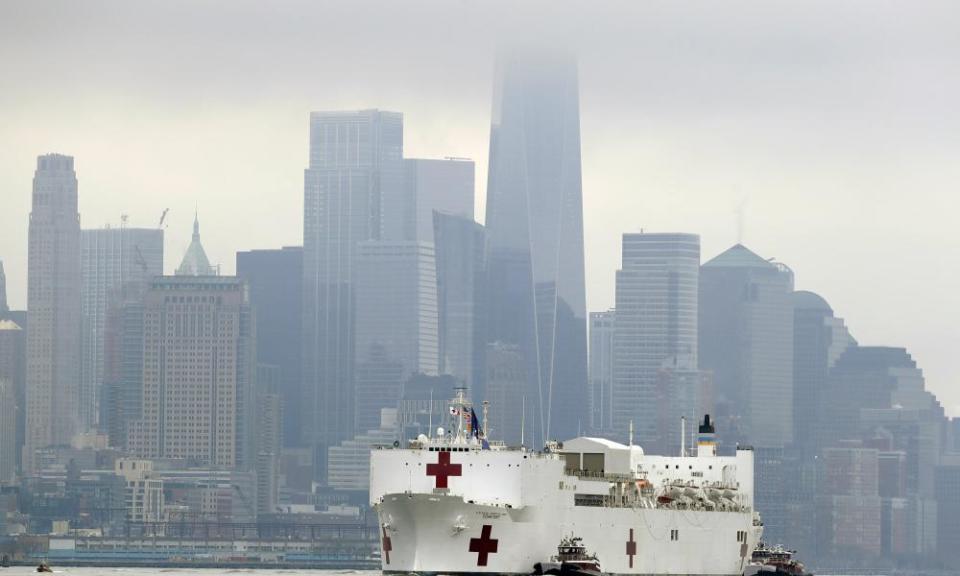The vacant Comfort hospital ship is a symbol of our coronavirus failure

The USNS comfort, the navy hospital ship deployed to New York City this week, was supposed to house 1,000 patients. Instead, it’s taken in only 20, refusing to accept New Yorkers suffering with coronavirus.
Sitting on idle on the Hudson River, the ship is quickly becoming a symbol of all that has gone horrifically wrong with both the federal and local response to the Covid-19 outbreak. There are about 50,000 confirmed coronavirus cases in New York City alone, with more than a thousand dead. Many, with the right course of action, could have been prevented.
Donald Trump, who has bumbled through every conceivable facet of preparation for this once-in-a-century pandemic, saw off the ship in Virginia to much fanfare. Bill de Blasio, the mayor of New York City, and Andrew Cuomo, the governor of New York, greeted it upon arrival. But military and bureaucratic hurdles have prevented the Comfort from accepting most patients.
Strict rules are preventing people infected with the virus from coming on board. The navy is also refusing to treat a host of other conditions. Guidelines sent to hospitals included a list of 49 medical conditions that would exclude a patient from admittance to the ship.
Ambulances cannot take patients directly to the Comfort. First, they must deliver patients to a city hospital to be tested for the virus and then pick them up again for transport to the ship. Hospital leaders rightfully find the delays untenable.
In New York City, hospitals are besieged. Patients are dying in hallways. Refrigerated trucks are now makeshift morgues. Doctors and nurses are forced to reuse protective gear, some even donning trash bags. The city is running dangerously low on ventilators and even body bags.
The ship, sitting nearly empty, is almost a mockery of all the suffering taking place on land. If it won’t treat coronavirus patients, it will hardly treat anyone: since so few people are going outside, non-coronavirus injuries and illnesses have plummeted.
The solution is obvious enough. Open the navy hospital ship to coronavirus patients and let the Comfort join the ranks of other temporary hospitals in New York, like the 1,000-bed facility at the Javits Center, which in better times hosts book expos and auto shows.
There are understandable challenges to making the Comfort ready for Covid-19 patients. Infections could spread easily in a confined area. The cramped conditions are suitable for wounded sailors but not necessarily civilians. When Hurricane Maria ravaged Puerto Rico, the Comfort failed to relieve much of the strain of hospitals, treating only six patients a day.
Ultimately, politicians like Trump and Cuomo invested far too much hope in one hospital ship. It’s the tragic consequence of failing in the most brutal way to prepare for such a pandemic. America knew what was happening in China, Spain, Italy and elsewhere: there were many weeks of lead time that other countries couldn’t benefit from.
Trump, a deeply incompetent executive who denies science, could not ramp up testing to create any kind of accurate picture of which Americans were infected and needed to be quarantined. Federal guidelines for social distancing came too late. Medical supplies weren’t produced. Companies were not compelled, by law, to produce them.
Cuomo, perceived as a hero because Trump is so ill-fit for a crisis, has not performed much better. Though New York had more coronavirus cases, the state government closed public schools and implemented a shelter-in-place order after states like California, Ohio and Michigan, even though New York was the center of the outbreak. The curve was not flattened enough. New York, like northern Italy before it, is in a state of catastrophe.
Meanwhile, a vacant hospital ship floats uselessly on the river. For now, it’s sadly representative of the federal and local response to coronavirus: too little and far too late.
Ross Barkan is a journalist based in New York City.

 Yahoo News
Yahoo News 